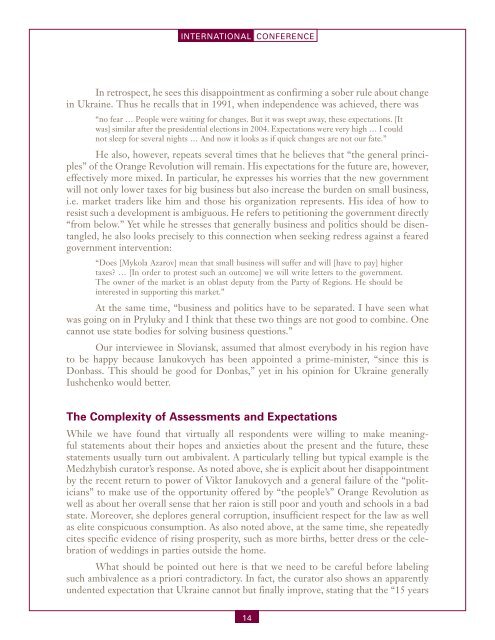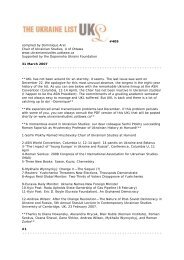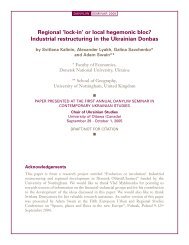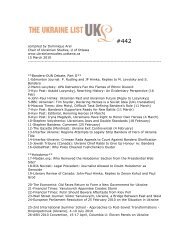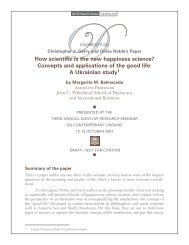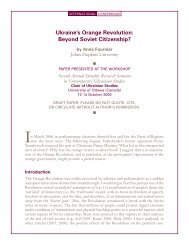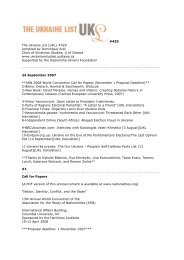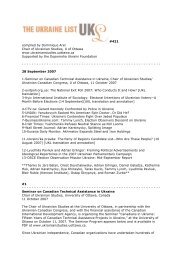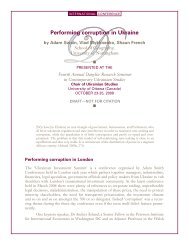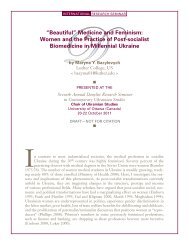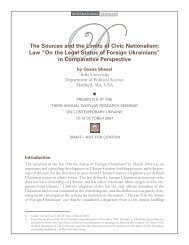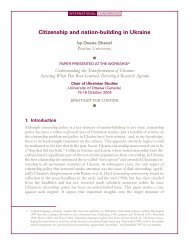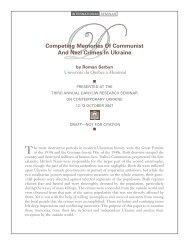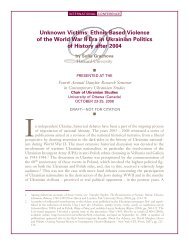Paper - Chair of Ukrainian Studies
Paper - Chair of Ukrainian Studies
Paper - Chair of Ukrainian Studies
Create successful ePaper yourself
Turn your PDF publications into a flip-book with our unique Google optimized e-Paper software.
international CONFERENCE<br />
In retrospect, he sees this disappointment as confirming a sober rule about change<br />
in Ukraine. Thus he recalls that in 1991, when independence was achieved, there was<br />
“no fear … People were waiting for changes. But it was swept away, these expectations. [It<br />
was] similar after the presidential elections in 2004. Expectations were very high … I could<br />
not sleep for several nights … And now it looks as if quick changes are not our fate.”<br />
He also, however, repeats several times that he believes that “the general principles”<br />
<strong>of</strong> the Orange Revolution will remain. His expectations for the future are, however,<br />
effectively more mixed. In particular, he expresses his worries that the new government<br />
will not only lower taxes for big business but also increase the burden on small business,<br />
i.e. market traders like him and those his organization represents. His idea <strong>of</strong> how to<br />
resist such a development is ambiguous. He refers to petitioning the government directly<br />
“from below.” Yet while he stresses that generally business and politics should be disentangled,<br />
he also looks precisely to this connection when seeking redress against a feared<br />
government intervention:<br />
“Does [Mykola Azarov] mean that small business will suffer and will [have to pay] higher<br />
taxes? … [In order to protest such an outcome] we will write letters to the government.<br />
The owner <strong>of</strong> the market is an oblast deputy from the Party <strong>of</strong> Regions. He should be<br />
interested in supporting this market.”<br />
At the same time, “business and politics have to be separated. I have seen what<br />
was going on in Pryluky and I think that these two things are not good to combine. One<br />
cannot use state bodies for solving business questions.”<br />
Our interviewee in Sloviansk, assumed that almost everybody in his region have<br />
to be happy because Ianukovych has been appointed a prime-minister, “since this is<br />
Donbass. This should be good for Donbas,” yet in his opinion for Ukraine generally<br />
Iushchenko would better.<br />
The Complexity <strong>of</strong> Assessments and Expectations<br />
While we have found that virtually all respondents were willing to make meaningful<br />
statements about their hopes and anxieties about the present and the future, these<br />
statements usually turn out ambivalent. A particularly telling but typical example is the<br />
Medzhybish curator’s response. As noted above, she is explicit about her disappointment<br />
by the recent return to power <strong>of</strong> Viktor Ianukovych and a general failure <strong>of</strong> the “politicians”<br />
to make use <strong>of</strong> the opportunity <strong>of</strong>fered by “the people’s” Orange Revolution as<br />
well as about her overall sense that her raion is still poor and youth and schools in a bad<br />
state. Moreover, she deplores general corruption, insufficient respect for the law as well<br />
as elite conspicuous consumption. As also noted above, at the same time, she repeatedly<br />
cites specific evidence <strong>of</strong> rising prosperity, such as more births, better dress or the celebration<br />
<strong>of</strong> weddings in parties outside the home.<br />
What should be pointed out here is that we need to be careful before labeling<br />
such ambivalence as a priori contradictory. In fact, the curator also shows an apparently<br />
undented expectation that Ukraine cannot but finally improve, stating that the “15 years<br />
14


